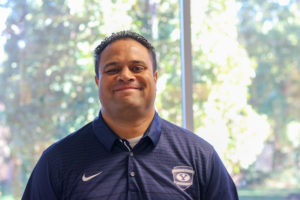
Several policies and practices have changed within The Church of Jesus Christ of Latter-day Saints since the October 2017 General Conference. Many of the changes took place after the April 2018 sessions. Some changes include the replacement of home and visiting teaching with ministering, the introduction of online mission calls and the separation of the church from the Boy Scouts of America organization. The upcoming session of General Conference is Oct. 6 and 7.
Primary teachers
The policy requiring two adults be present at all times when teaching children was introduced on March 26. These adults can be two unrelated men, a husband and wife, or two members of the same family.
The purpose of men holding teaching positions within the church, according to the church’s handbook, is to give all children access to the influence of a worthy priesthood holder. Requiring two responsible adults’ presence at all times in classrooms is to protect the children and the teachers, according to the handbook. However, in instances where this isn’t practical, like in smaller congregations, a member of the Primary presidency must frequently check in on the class.
Ministering
During the April 2018 Sunday afternoon session of General Conference, President Russell M. Nelson announced a shift from home and visiting teaching to ministering.
Rather than having a separation between male and females like in home and visiting teaching, ministering combines the efforts of the priesthood quorums with the Relief Society to serve members of the church, according to lds.org.
“Rather than leaders just handing out slips of paper, it looks like counseling about the individuals and families in person as assignments are given to ministering brothers and sisters,” said Relief Society General President Sister Jean B. Bingham. “It looks like visiting in person or talking on the phone or chatting online or texting. It looks like delivering a birthday card and cheering at a soccer game. It looks like sharing a scripture or quote from a conference talk that would be meaningful to that individual.”
Rather than requiring members to record monthly meetings with those they were assigned, ministering encourages members to serve others and help them meet their spiritual needs.

“I like the introduction of ministering. I don’t think a lot of people were doing their home teaching, but ministering gives people the chance to keep in touch through different methods,” said Morris Havea, BYU extramural sports program manager and bishop of the Sunset 12 Tongan Ward.
Scouting
On May 8, the church released a joint statement with the Boy Scouts of America declaring that, after more than 100 years of partnership, it will discontinue its role as a chartered partner with BSA by 2020.
“I think there are a lot of mixed feelings about scouting — personally, I think it’s a great thing. I think those that want to do scouting can choose to do scouting, (but) I think it’s a good change not to have scouting be something that’s forced on people,” said Jim Slaughter, BYU Non-Denominational Chaplain.

The joint statement said that in the past century the church has been linked with BSA, the church grew from a mostly U.S.-centered institution to a global organization.
To embrace the growing international membership, the church’s statement said it plans to create and implement its own youth leadership and development program. The official separation will take effect on Dec. 31, 2019, according to the statement.
Bishop interviews
A letter from the First Presidency on June 20 announced that youth in the church are now allowed to invite a parent or another adult into interviews with their bishop.
This rule was introduced to help youth feel more comfortable during their bishop interviews, and give parents information about their children’s personal lives, according to the letter.
The letter also says “bishops and their counselors have a sacred responsibility to lead, teach and inspire youth” and “effective personal interviews are one important way they do this.”
‘Preach My Gospel’
The church released an updated digital version of “Preach My Gospel” on June 22. The program hadn’t been updated since it was published 14 years ago.
According to lds.org, the changes made to “Preach My Gospel” reduced the number of key indicators in the text, swapped home and visiting teaching references with ministering and adapted the “Preach My Gospel” program to align with the most recent family history policies.
Karen Toone, a BYU senior and former MTC teacher, said MTC teachers were recently instructed to refer to people interested in the church as “interested people” instead of “investigators.”
“I think a lot of it is to see them as people and associate the person with the name and not just a title,” Toone said. “It’s easy to put ‘investigators’ into a category, but for me, calling them people of interest, it just makes it more meaningful.”
Toone said she loves the updates to “Preach My Gospel” because they focus more on the doctrine of Christ, expound on the doctrine on same-sex attraction and give missionaries more helpful instructions to help people struggling with addiction.
“I just think, compared to the last 14 years, it’s been something that the missionaries have had to talk a lot more about,” Toone said about addiction and same-sex attraction. “That’s what people are struggling with and that’s what comes up in our debates. I think it’s really good for the missionaries to have more guidance on the church’s stance and how to help people who have those problems.”
Teaching resources
On June 29, the First Presidency released a letter announcing a new resource for promoting personal and family scripture study called “Come, Follow Me — For Individuals and Families.”
According to lds.org, households in the church can receive a copy of “Come, Follow Me — For Individuals and Families.” This resource will correspond with two new resources for church classes called “Come, Follow Me — For Primary” and “Come, Follow Me — For Sunday School.”
Teachers are instructed to begin using these resources in January 2019.
Church name policy
On Aug. 16, President Nelson released a statement outlining how individuals should refer to the name of the church.
He encouraged readers to refer to the church by its full name, “The Church of Jesus Christ of Latter-day Saints” rather than “Mormon Church” or the “LDS Church.” When referring to the church in short, “the church,” the “Church of Jesus Christ” and the “restored Church of Jesus Christ” are all accurate, according to President Nelson.
The term “Mormon Church” has been frequently used in the past, but upon President Nelson’s August announcement, the term is now discouraged along with “LDS Church,” another popular term. The use of “Mormon” in reference to the Book of Mormon or when used in historical accounts is correct, according to the updated style guide.
The style guide also says when referring to members of the church, titles like “members of The Church of Jesus Christ of Latter-day Saints” and “Latter-day Saints” are both correct. The term “Mormon” should not be used when referring to members of the church, and the word “Mormonism” should not be used.
Church history book released
On Sept. 4, a book called “Saints: The Story of the Church of Jesus Christ in the Latter Days” was released in the Gospel Library app, online and in print.
According to lds.org, “Saints” is the only long-form church history series released in the past 88 years. The novel was written to help members of the church learn about the history of the Restoration and witness the will of God.
Mission calls
On Sept. 5, the church announced that missionaries will begin receiving their calls online, rather than through the mail.
According to lds.org, “by the end of 2018, it is anticipated that nearly all missionaries around the world with reliable Internet access will receive their calls online.”
Changing receiving mission calls through the mail to receiving them electronically is to reduce wait time for missionaries, according to Elder Brent H. Nielson, a General Authority Seventy and the executive director of the Missionary Department for the church.
Changes made to church policies over the past 12 months have already begun to affect its members, just as future changes will.
The 188th Semiannual General Conference of The Church of Jesus Christ of Latter-day Saints will take place Oct. 6–7 at the Conference Center in Salt Lake City.
General Conference will include five sessions: the general women’s session for sisters age 8 and older (occurring Oct. 6 at 6 p.m. MDT) and four general sessions for individuals and families (occurring Oct 6 and 7 at 10 a.m. and 2 p.m. MDT).




